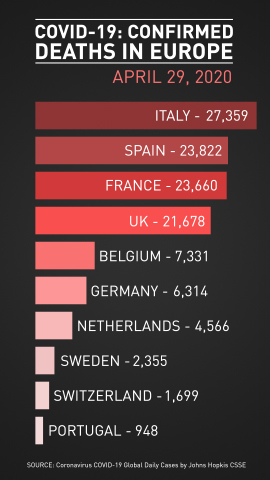-
Spain's prime minister, Pedro Sanchez, has said he hopes by"the end of June" the countrycan enter a new "normal stage" when COVID-19 has been controlled. He also announced a four-step guide to how the government will achieve this.
-
Hotels in Poland will reopen on 4 May for the summer holidays but school closures have been extended to 23 May.
-
The Olympic Games, now scheduled for 2021, will only take place if 'the world has won its battle against the coronavirus pandemic," says Japan's prime minister, Shinzo Abe.
-
Russia reported 5,841 new confirmed cases on Wednesday, bringing the total to 99,399. Deaths also rose to a total of **972, **an increase of 108 in the past 24 hours.
-
In a survey carried out by the Ifo institute, 29.2 percent of German businesses think they would survive for a maximum of three months if the lockdown restrictions remained.
-
The French government has said it will tighten restrictions on investment from outside Europe to limit foreign control over certain sectors in the country.
-
Serbia will restart ** bus and rail services as the easing of some lockdown measures continues. Commercial flights will also resume** .
-
Four medical universities in Hungary have joined forces to begin testing around 18,000 citizens, starting on 1 May , to get a better picture of infection rates.
-
The risk of asecond peak in the UK is**"very real," **according to health secretary Matt Hancock, who has called for people to remain at home for now.
-
Car maker Volkswagen restarts its production at its Wolfsburg, Germany factory this week. The firm says it expects to produce 1,400 cars in the first week back, to then ramp up to 6,000 per week after that.

Spain's prime minister, Pedro Sanchez, has said he hopes by the end of June the country will be able to enter a 'normal stage' when COVID-19 has been controlled. /AP
ACROSS EUROPE:
By Guy Henderson
Will Germany have to retighten its lockdown? The country's public health body, the Robert Koch Institute (RKI), released figures showing the country's reproductive number had risen to 1.0 again – that is, each infected person was now infecting on average one other person. That's the highest level since 14 April, though it has moved up and down below 1.0 slightly since then.
Despite early successes, officials say the path back to normality here is a narrow one, particularly in a country with so many cases (156,200 as of 20:15 local time on Tuesday, says RKI). One small change to conditions can lead to a significant shift in the number of cases. With an "R-number" of 1.1, the health system would reach capacity by late autumn. At 1.2, beds could be full by mid-summer.
By Tuesday evening, though, the figure had been updated to show it had dipped again to 0.9. Perhaps policymakers will pause after this latest update.
It goes to show that even in those countries that have acted fast and efficiently in response to this pandemic, that success can still be undone. There is still a long way to go.
The City of Berlin has moved quickly to become the last German state to make face masks mandatory in shops. They are already compulsory on public transport.
The German cabinet is set to agree an extension of the country's worldwide non-essential travel warning for citizens "until further notice" and at least until 14 June. That is just before the summer holidays, for now.
By Isobel Ewing in Budapest
Coronavirus tests performed by private laboratories and companies on thousands of people in Hungary show the virus hasn't spread through the wider population, according to Semmelweis University in Budapest.
Four Hungarian medical universities have jointly announced they will begin testing a representative sample of about 18,000 people across the country from 1 May, to get a better picture of infection rates.
Private laboratories and companies have already been testing thousands of people, said Béla Merkely, the rector of Semmelweis University.
According to the results, outbursts of the virus were mainly confined to nursing homes and hospitals, and there are fewer confirmed infections among the population. The proportion of positive tests is now steadily declining, Merkely said.
00:10

By Nawied Jabarkhyl in London
From Wednesday, millions more people in the UK can apply to get tested for the coronavirus. Testing will be extended to those aged over-65 with symptoms or essential workers and their households. With only two days left in April, the government wants to reach its target of being able to test 100,000 a day by the end of the month. It will be desperate to avoid missing that goal and risking more criticism of its handling of the virus.
Also on Wednesday, the UK will publish the total number of COVID-19 deaths in hospitals, care homes and the wider community. So far, the government has just been releasing hospital deaths, leading to concerns over the accuracy of data.
And global fast food giant McDonald's says it's reopening its first store in the UK. But, the bad news for patrons is that it's just for "operational" testing at this stage and not open to customers.
By Toni Waterman in Brussels
The European Union
With the summer holiday season right around the corner, the fight is on to reopen borders and get planes back into the air. Transport Ministers meet via video link on Wednesday to discuss a coordinated lifting of lockdown measures and ways to shore up struggling airlines, while keeping people safe. Ministers say physical distancing needs to be maintained, perhaps by keeping every middle seat on airplanes empty. European carriers have already balked at the idea.
Belgium
A rheumatoid arthritis drug is proving effective in helping coronavirus patients. Researchers at the University of Gent, who are conducting a clinical trial of the drug Tocilizumab, say it has helped 50 patients so far by curbing an excessive inflammatory response to the disease. This could help limit lung damage.A French study has found similar benefits.
As the country prepares to lift lockdown measures, officials in Brussels say they will create an additional 40 kilometers of bike paths to encourage cycling over the use of public transport. New paths will be created on main roads, where officials have already slashed the speed limit to 30 km/h in a bid to make cycling and walking safer.
02:29

FROM OUR GLOBAL COLLEAGUES:
CGTN China :
No Country can be great in isolation - Chinese UN ambassador
CGTN America :
U.S. COVID-19 deaths exceed Vietnam War
CGTN Africa :
Nigerian President announces decision to ease COVID-19 lockdown order
CGTN Europe has been providing in-depth coverage of the novel coronavirus story as it has unfolded.
Here
you can read the essential information about the crisis.
Sign up
here
to get the COVID-19 Europe bulletin sent directly to your inbox
 简体中文
简体中文

